-
 Bitcoin
Bitcoin $114400
1.32% -
 Ethereum
Ethereum $3499
2.20% -
 XRP
XRP $2.922
4.26% -
 Tether USDt
Tether USDt $0.0000
0.03% -
 BNB
BNB $752.6
1.53% -
 Solana
Solana $161.8
1.64% -
 USDC
USDC $0.9999
0.01% -
 TRON
TRON $0.3267
1.32% -
 Dogecoin
Dogecoin $0.1991
3.02% -
 Cardano
Cardano $0.7251
3.29% -
 Hyperliquid
Hyperliquid $38.32
3.36% -
 Stellar
Stellar $0.3972
7.58% -
 Sui
Sui $3.437
2.74% -
 Chainlink
Chainlink $16.29
3.65% -
 Bitcoin Cash
Bitcoin Cash $545.3
3.70% -
 Hedera
Hedera $0.2482
7.49% -
 Ethena USDe
Ethena USDe $1.001
0.03% -
 Avalanche
Avalanche $21.40
2.02% -
 Toncoin
Toncoin $3.579
1.56% -
 Litecoin
Litecoin $109.3
2.20% -
 UNUS SED LEO
UNUS SED LEO $8.951
-0.18% -
 Shiba Inu
Shiba Inu $0.00001220
2.75% -
 Polkadot
Polkadot $3.613
2.99% -
 Uniswap
Uniswap $9.173
3.78% -
 Monero
Monero $302.6
2.62% -
 Dai
Dai $0.0000
0.00% -
 Bitget Token
Bitget Token $4.320
1.52% -
 Pepe
Pepe $0.00001048
3.40% -
 Cronos
Cronos $0.1314
4.33% -
 Aave
Aave $259.4
3.54%
What are the investor protection measures of a Bitcoin ETF?
Bitcoin ETFs offer secure custody and storage practices, with physical storage in offline cold storage facilities, third-party custodians, and insurance coverage to safeguard investor assets.
Feb 16, 2025 at 05:48 pm
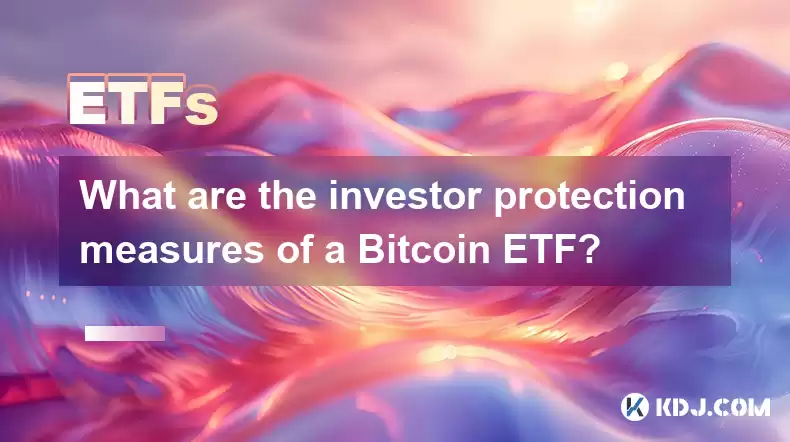
Key Points
- Secure Custody and Storage
- Transparency and Disclosure
- Regulatory Oversight
- Fund Insurance and Protection
- Investor Education and Resources
Investor Protection Measures of a Bitcoin ETF
Secure Custody and Storage
- Physical Storage: ETFs store Bitcoin in secure, offline cold storage facilities that are physically guarded and monitored. These facilities employ multiple layers of security, including biometric access control, intrusion detection systems, and armed guards.
- Third-Party Custodians: Bitcoin ETFs typically partner with reputable third-party custodians, such as Coinbase or BitGo, to safeguard customer assets. These custodians have stringent security protocols and are subject to regular audits and regulatory inspections.
- Insurance Coverage: ETFs may secure their assets with insurance policies to mitigate the risk of theft, hacking, or other security breaches. These policies provide financial protection to investors in case of unforeseen events.
Transparency and Disclosure
- Regular Reporting: ETFs are required to publish regular reports that provide investors with up-to-date information about the fund's performance, holdings, and financials. This transparency enables investors to make informed decisions about their investments.
- Independent Audits: ETFs undergo independent audits by qualified accounting firms to ensure the accuracy and integrity of their financial statements. These audits verify that the fund's assets are being managed responsibly and in accordance with regulations.
- Prospectus Information: At the time of an offering, a Bitcoin ETF will create and file an offering circular with market regulators. This document discloses all necessary details about the fund, including investment strategies, risks, fees, and regulatory compliance. It provides potential investors with the information they need to make informed decisions.
Regulatory Oversight
- SEC Registration: Bitcoin ETFs are subject to registration and regulation by the Securities and Exchange Commission (SEC). The SEC reviews an ETF's application to ensure that it complies with all legal requirements and that it is in the best interests of investors.
- Compliance with Securities Laws: ETFs must comply with all applicable securities laws and regulations, including those governing disclosure, fraud, and insider trading. These laws protect investors from unfair or deceptive practices.
Fund Insurance and Protection
- Federal Deposit Insurance Corporation (FDIC) coverage: ETFs that are invested in FDIC-insured deposits may benefit from this federal protection, which covers customer deposits up to $250,000 at participating depository institutions.
- Securities Investor Protection Corporation (SIPC) coverage: SIPC provides limited protection for investors in case of the failure of a brokerage firm that holds their securities. SIPC provides coverage up to $500,000, including $250,000 for cash.
Investor Education and Resources
- Educational Materials: ETF issuers and regulatory bodies provide educational materials and resources to help investors understand the risks and benefits of investing in Bitcoin ETFs. These materials include investor guides, whitepapers, and webinars.
- Investor Support: ETFs typically offer investor support services to answer questions and provide information about the fund's performance and management. This support helps investors navigate the complex world of cryptocurrency investing.
FAQs
Q: Are Bitcoin ETFs insured against hacking or theft?
A: ETFs may purchase insurance to cover the risk of theft or hacking. However, it's important to understand that insurance coverage may have limits or exclusions.
Q: What happens to my investment if the Bitcoin ETF fails or closes?
A: In the unlikely event of an ETF failure or closure, the assets would be distributed to investors in accordance with the fund's liquidation plan.
Q: Are Bitcoin ETFs considered a good investment?
A: The suitability of a Bitcoin ETF as an investment depends on individual risk tolerance and investment goals. Investors should conduct thorough research and consult financial advisors to determine if an ETF is appropriate for their portfolio.
Q: Can I use Bitcoin ETFs to buy and sell Bitcoin directly?
A: Bitcoin ETFs typically do not allow direct purchase or sale of Bitcoin. They provide investors with exposure to the price of Bitcoin without the need to hold the underlying asset.
Disclaimer:info@kdj.com
The information provided is not trading advice. kdj.com does not assume any responsibility for any investments made based on the information provided in this article. Cryptocurrencies are highly volatile and it is highly recommended that you invest with caution after thorough research!
If you believe that the content used on this website infringes your copyright, please contact us immediately (info@kdj.com) and we will delete it promptly.
- Cryptocurrency, Altcoins, and Profit Potential: Navigating the Wild West
- 2025-08-04 14:50:11
- Blue Gold & Crypto: Investing Disruption in Precious Metals
- 2025-08-04 14:30:11
- Japan, Metaplanet, and Bitcoin Acquisition: A New Era of Corporate Treasury?
- 2025-08-04 14:30:11
- Coinbase's Buy Rating & Bitcoin's Bold Future: A Canaccord Genuity Perspective
- 2025-08-04 14:50:11
- Coinbase's Buy Rating Maintained by Rosenblatt Securities: A Deep Dive
- 2025-08-04 14:55:11
- Cryptos, Strategic Choices, High Returns: Navigating the Meme Coin Mania
- 2025-08-04 14:55:11
Related knowledge
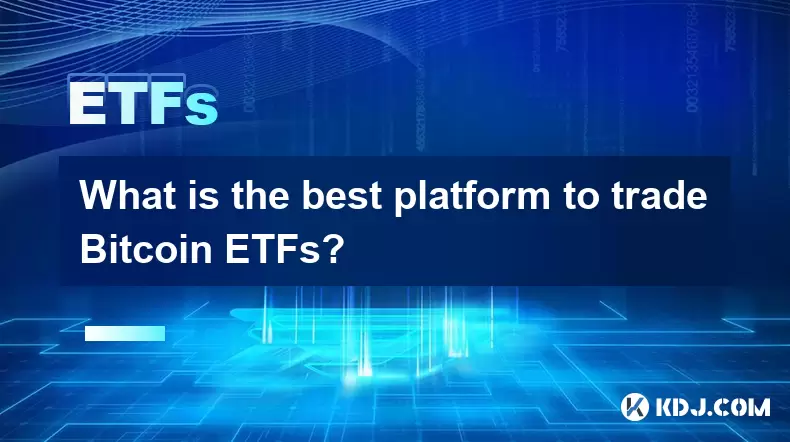
What is the best platform to trade Bitcoin ETFs?
Jul 23,2025 at 04:14am
Understanding Bitcoin ETFs and Their Role in TradingBitcoin Exchange-Traded Funds (ETFs) have gained significant traction among traditional and crypto...
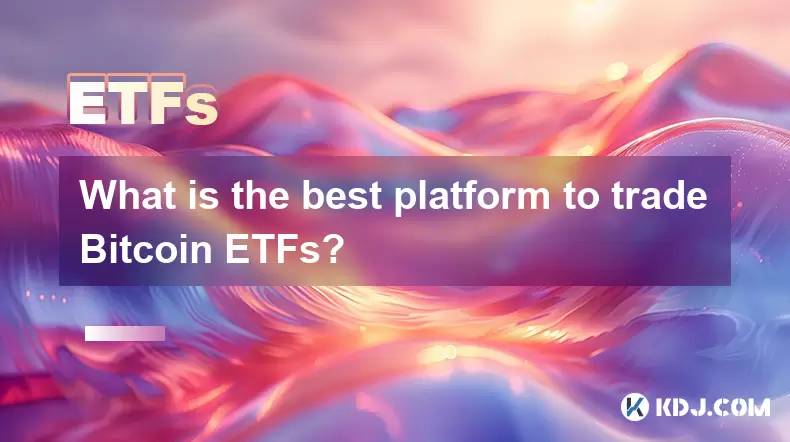
What is the best platform to trade Bitcoin ETFs?
Jul 17,2025 at 03:50pm
Understanding Bitcoin ETFs and Their Role in the MarketBitcoin Exchange-Traded Funds (ETFs) are investment vehicles that track the price of Bitcoin wi...
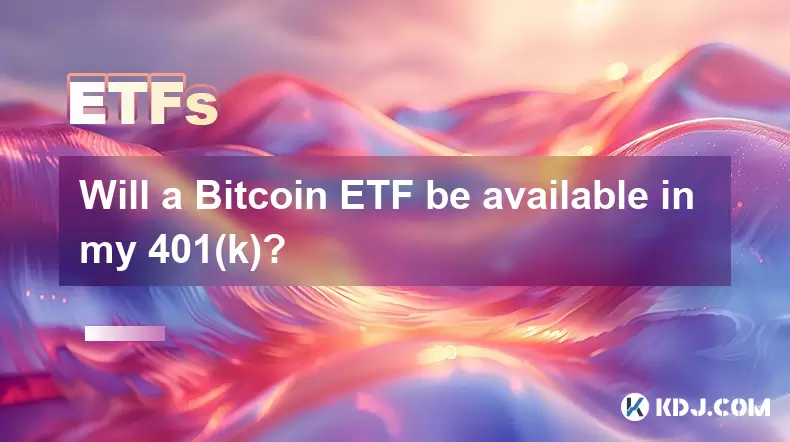
Will a Bitcoin ETF be available in my 401(k)?
Jul 17,2025 at 10:42pm
What is a Bitcoin ETF?A Bitcoin ETF (Exchange-Traded Fund) is an investment vehicle that tracks the price of Bitcoin without requiring investors to di...
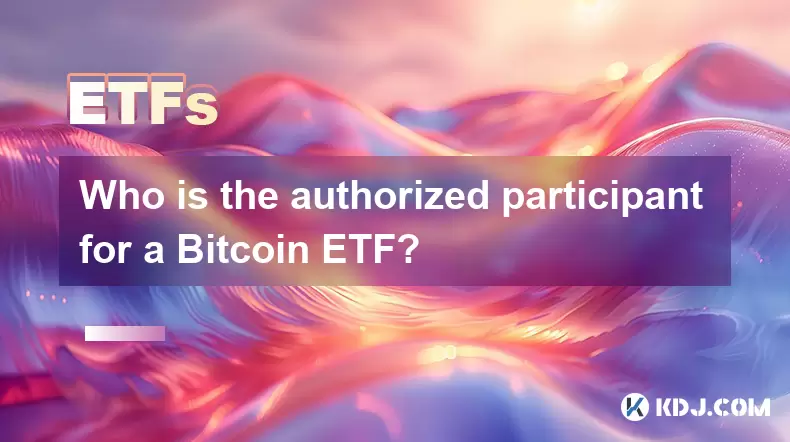
Who is the authorized participant for a Bitcoin ETF?
Jul 18,2025 at 12:42am
Understanding the Role of Authorized Participants in Bitcoin ETFsIn the context of Bitcoin Exchange-Traded Funds (ETFs), an authorized participant (AP...
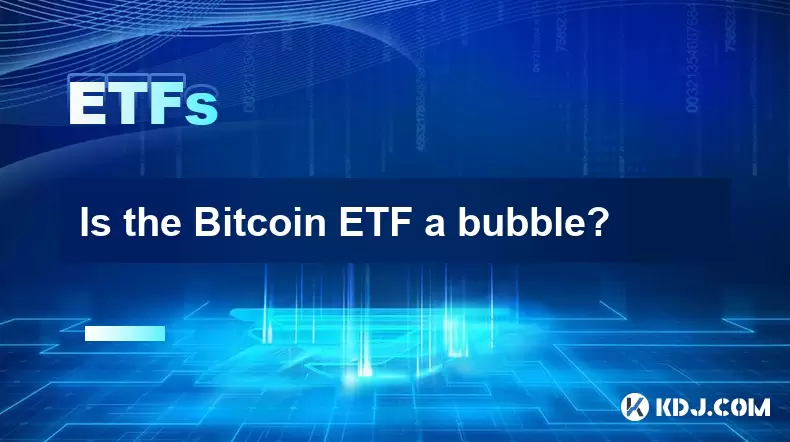
Is the Bitcoin ETF a bubble?
Jul 20,2025 at 06:57am
Understanding the Bitcoin ETF ConceptA Bitcoin Exchange-Traded Fund (ETF) is a financial product that aims to track the price of Bitcoin without requi...
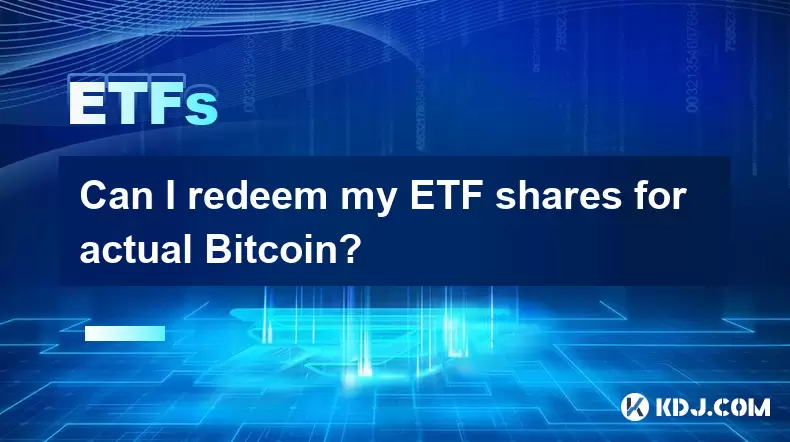
Can I redeem my ETF shares for actual Bitcoin?
Jul 17,2025 at 03:14pm
Understanding ETF Shares and Their Relation to BitcoinExchange-Traded Funds (ETFs) have become a popular investment vehicle for those looking to gain ...

What is the best platform to trade Bitcoin ETFs?
Jul 23,2025 at 04:14am
Understanding Bitcoin ETFs and Their Role in TradingBitcoin Exchange-Traded Funds (ETFs) have gained significant traction among traditional and crypto...

What is the best platform to trade Bitcoin ETFs?
Jul 17,2025 at 03:50pm
Understanding Bitcoin ETFs and Their Role in the MarketBitcoin Exchange-Traded Funds (ETFs) are investment vehicles that track the price of Bitcoin wi...

Will a Bitcoin ETF be available in my 401(k)?
Jul 17,2025 at 10:42pm
What is a Bitcoin ETF?A Bitcoin ETF (Exchange-Traded Fund) is an investment vehicle that tracks the price of Bitcoin without requiring investors to di...

Who is the authorized participant for a Bitcoin ETF?
Jul 18,2025 at 12:42am
Understanding the Role of Authorized Participants in Bitcoin ETFsIn the context of Bitcoin Exchange-Traded Funds (ETFs), an authorized participant (AP...

Is the Bitcoin ETF a bubble?
Jul 20,2025 at 06:57am
Understanding the Bitcoin ETF ConceptA Bitcoin Exchange-Traded Fund (ETF) is a financial product that aims to track the price of Bitcoin without requi...

Can I redeem my ETF shares for actual Bitcoin?
Jul 17,2025 at 03:14pm
Understanding ETF Shares and Their Relation to BitcoinExchange-Traded Funds (ETFs) have become a popular investment vehicle for those looking to gain ...
See all articles

























































































